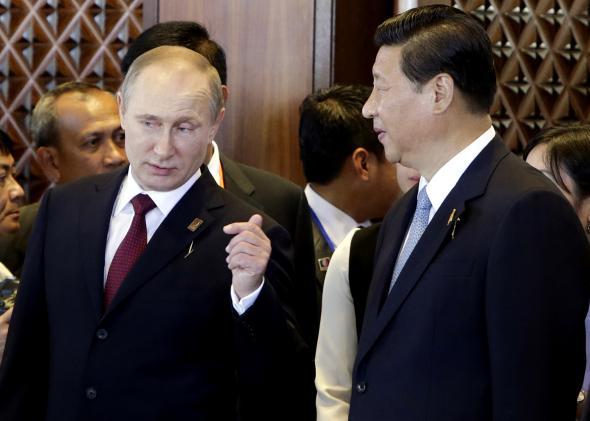Foreign Minister Sergei Lavrov has touted the fact that that Russia and China have “broadly coinciding points of view” on the situation in Ukraine, and certainly Beijing hasn’t joined the U.S. and Europe in rushing to condemn the taking of Crimea. But Beijing’s stance on this may actually be a bit more nuanced. (See China Digital Times for a useful roundup of commentary on China’s reaction to the crisis.)
China is a close ally of Russia on a number of fronts and shares with it a distrust of Western efforts to support “color revolutions” in other countries. The two have formed something of a sovereignty caucus on the U.N. Security Council, and China has similar fears to Russia of encirclement by hostile smaller countries supported by the United States.
But then again, Russia’s actions in Ukraine could also be seen as exactly the sort of interference in another country’s affairs and violation of its sovereignty that makes Beijing nervous.
The reflexively hawkish Global Times editorializes that “Chinese public opinion should firmly stand by Russia and support its resistance to pressure from the West. Such resistance is the real picture of the Ukraine crisis.”
But Foreign Ministry Spokesman Qin Gang, via Xinhua, was a bit more circumspect:
Condemning violences [sic] over the past days in Ukraine, Qin said China has been urging all parties in Ukraine to address their domestic disputes peacefully in accordance with the country’s law, safeguard the legitimate rights of the Ukrainian people of all ethnics, and restore social order as soon as possible.
Qin said China always sticks to the principle of non-interference in any country’s internal affairs and respects the independence, sovereignty and territorial integrity of Ukraine.
“There have been reasons for today’s situation in Ukraine,” said the spokesman, without detailing the reasons.
While not as extensive as its partnerships with Russia, China’s economic relationship with Ukraine is deepening. Last year, as Alejandro Litovsky writes, “Ukraine agreed to a plan to lease 5% of the country’s land to Chinese state-owned companies for agricultural production.” China also imports arms and bought its first aircraft carrier from Ukraine.
Some in Washington have made the case that if Russia faces few consequences for its invasion of Crimea, it could encourage China to seize the islands it claims in the East and South China Seas. Like Robert Farley, I tend to think that the notion of “precedents” like this is a bit overrated. The situations are also so different—in Asia, we’re talking about uninhabited islets, not a large territory full of Chinese people; unlike Ukraine, Japan is a stable and unified country with a long-standing mutual defense agreement with the United States—that I kind of doubt strategists in Beijing are drawing too many useful lessons right now.
It seems for the moment as though the Chinese government will continue to support Russia, but not that loudly, and like the rest of us, hopes the situation will resolve itself quickly.
